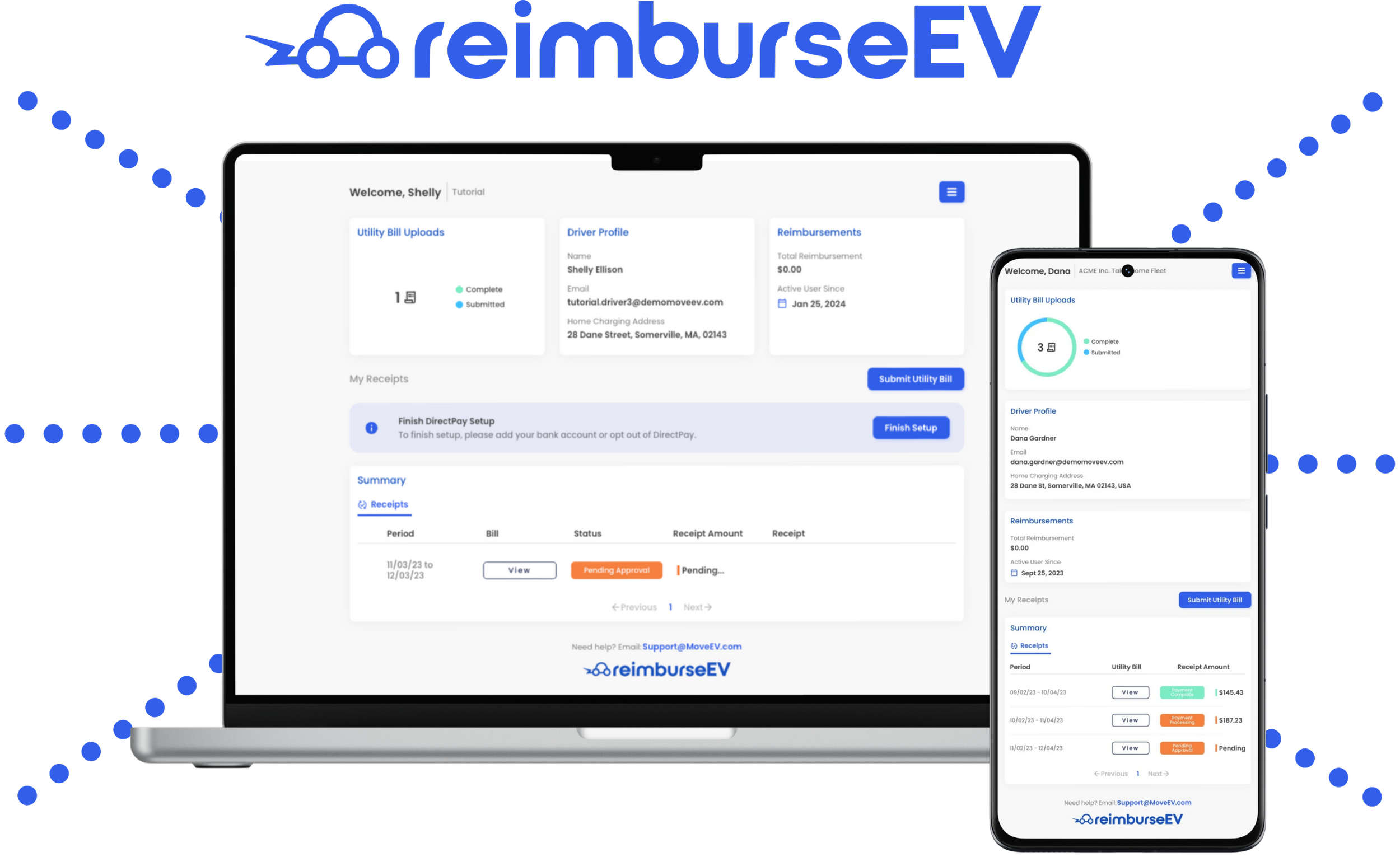
The accurate home charging
reimbursement solution
for electric fleets
Fast and easy IRS- and CRA- compliant receipts. All electric fleet vehicle (EV) models. All charger types.
Some of our clients include:

Home charging reimbursement solved!
ReimburseEV is the easy, accurate, universal home charging reimbursement system both drivers and administrators love.

Why is accurate reimbursement so important?
-

Tax-Free Payments
Unlike stipends, accurate reimbursement payments are tax-free for you and your employees, which can save up to 37%!
-

Eliminates Overpayment
Without the correct software and expertise, it is easy to make costly miscalculation errors. Avoiding overpayment can save thousands per driver.
-

Reduce Liability Risk
Mitigate risk of underpayment and class action lawsuits under CA2802 with accurate and auditable receipts.
-

Saves Valuable Time
Save employees headaches and days of administrative time calculating and paying monthly reimbursements.
How it Works
Utility bills and telematics provide the most accurate and IRS- / CRA- compliant data for calculating accurate reimbursement for your fleet’s domicile vehicles.

What Our Clients Are Saying

The ReimburseEV™ Difference: A Client’s Perspective
We pride ourselves on providing the best possible experience for both our clients and drivers enrolled in our home charging reimbursement programs. Watch this video of DJ Johnson, Former Fortune 500 Company Fleet Manager, describe how and why he chose ReimburseEV™ and what it was like to work with our team.

Ready to start charging at home?
Not sure where to start? Learn about our EV take-home fleet advisory services.
David Lewis, Founder
Leadership Insights
To scale electric vehicles adoption, employees need to charge at home. David Lewis and Kate Harrison are leaders in the reimbursement space and regularly contribute to the top fleet publications. See below for some of their recent contributions.
Fleet Forward
How to Reimburse Electric Vehicle Drivers for Charging at Home
MoveEV Founder David Lewis explains why encouraging employees to charge at home makes financial and legal sense for companies. He also reviews the different reimbursement calculation options available to fleet managers.
Automotive Fleet
EV Charging at Home: Taxable Benefit or Work Tool?
MoveEV Founder David Lewis reviews the tax implications of reimbursing employees for installing EV chargers at their homes - including hardware and installation costs.
Kate Harrison, Co-Founder
Automotive Fleet
Fleet Manager's Guide to Common and Costly Home Charging Calculation Errors
This article, by MoveEV Co-Founder, Kate Harrison, highlights the complexities of reimbursing employees for home EV charging. It discusses the pitfalls of simplified reimbursement methods like flat allowances, regional rates, and average cost per kWh calculations.
Frequently Asked Questions
-
Home charging reimbursement ensures that employees who take fleet vehicles home are fairly compensated for the electricity used to charge their EVs. Without a reimbursement solution, drivers face out-of-pocket expenses, which can lead to dissatisfaction, increased charging costs, and reduced EV adoption rates.
-
ReimburseEV calculates reimbursements based on charging session data and employee utility bills, producing line-item receipts for all home charging events (including for employees bringing home multiple pooled fleet vehicles). By using accurate accounting, our solution ensures that driver payments are IRS-compliant tax-free reimbursed expenses. Our process is transparent and produces fair and auditable receipts, minimizing the risk of audit failures and tax liabilities for employers.
-
ReimburseEV supports any utility rate structures in the USA and Canada including:
Flat Rate Plans
Time-of-Use (TOU) Rates
Tiered Rates (Step Rates)
Seasonal Rates
Demand Charges (Commercial and Industrial Plans)
Solar Net Metering and Solar Offset Plans
Real-Time Pricing (RTP) Plans
Critical Peak Pricing (CPP) Plans
Variable Peak Pricing (VPP) Plans
Block Pricing (Inclining or Declining Block Rates)
Green Power Rates (Renewable Energy Plans)
Government-Subsidized Plans
Dual-Fuel (Electric + Gas) Rates
Prepaid Electricity Plans
Community Aggregation Rates
Fixed Bill Plans (All-Inclusive Monthly Rate)
Hybrid Plans (Combination of TOU and Tiered Rates)
This comprehensive support ensures accurate reimbursements for fleet drivers, no matter which plan they are on.
-
ReimburseEV is uniquely focused on accuracy, compliance, and ease of use. Unlike solutions that rely on live rate estimates, flat-rate reimbursements, or monthly kWh averages, our platform uses actual utility bills (parsing over 1,000 line item variations) to calculate precise reimbursements. This approach ensures fairness across all drivers, reduces administrative overhead, and meets IRS and CRA-compliance standards.
-
No, reimbursements should never be calculated based on live or projected utility rates. Our process relies on the final monthly utility bill to ensure accuracy, auditability, and compliance. Reimbursing based on live or estimated rates can introduce serious risks of error and compliance issues. Utility rates vary widely across regions and even households, with factors like time-of-use pricing, tiered rates, solar offsets, and government subsidies significantly affecting final costs. Without the actual utility bill as the source of truth, there is a risk of inaccurate, non-compliant reimbursements that could expose organizations to audit failures, tax liability issues, and class action law suit under CA2802. Inconsistent or inaccurate reimbursement methods can also erode trust between employers and employees, as perceived inequities in charging costs can quickly become problematic if one driver is reimbursed at an inflated rate while another is under-reimbursed. Uniformity across drivers is critical for fairness, compliance, and maintaining employee trust. By basing reimbursements on the actual utility bill, we provide a fully auditable, IRS-compliant process that protects both the employer and the employee.
-
Yes. Telematic data is the best source of charging event data according to the Department of Energy. ReimburseEV integrates seamlessly with leading telematics providers like Geotab and Samsara. We also offer customer integrations and non-telematic based charging event accounting, as needed.
-
Yes. ReimburseEV can manage reimbursements for plug-in hybrid vehicles (PHEVs) as well as fully electric vehicles (EVs). The platform tracks the electricity used for charging and ensures that drivers are reimbursed accurately for their home energy usage.
-
No! ReimburseEV works with all chargers, including Level 1 trickle chargers and non-networked Level 2 chargers.
-
Reimbursements can be issued directly to employees through payroll systems or other preferred payment methods. We offer automated submission to Concur, but also have DirectPay services that allow fleet managers to pay a single charging expense bill and have MoveEV disburses funds directly to drivers.
-
CA2802 is a California law that requires employers to reimburse employees for necessary work-related expenses, including the cost of charging an electric vehicle (EV) at home when used for business purposes.
For organizations with EV fleets in California, CA2802 makes home charging reimbursement a legal requirement. Employers must ensure that employees are fully and fairly compensated for the electricity costs incurred while charging a company vehicle at home, just as they would for other necessary business expenses.
Failing to comply with CA2802 can result in legal risks, employee disputes, and potential penalties.
Click here to learn more about CA2802.
MoveEV is a proud member of:






























